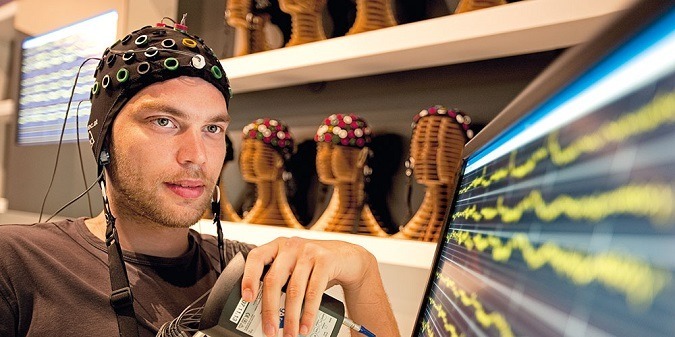Researchers stress need for neurotechnologies to protect the mental dimension of individuals and groups, especially mental privacy and integrity

Image: Ars Electronica | CC BY-NC-ND 2.0)
From Healthcare to Warfare: How to Regulate Brain Technology (University of Basel press release):
“The term “dual-use” refers to technology that can be used for both beneficial (i.e., medical) and harmful (i.e., military of terroristic) aims. Until recently, most dual-use technology emerged especially in virology and bacteriology. In the last years, however, military-funded research has entered the domain of neuroscience and neurotechnology.
This has resulted in a rapid growth in brain technology prototypes aimed at modulating the emotions, cognition, and behavior of soldiers. These include neurotechnological applications for deception detection and interrogation as well as brain-computer interfaces for military purposes.
Three bioethicists from the University of Basel have now argue in a study that an outright ban on military neurotechnology would not be ethically justified. …With the aging of the world population and the consequent prevalence of brain disorders, they argue, there is an increasing need for investment in neurotechnological innovation.
For this reason, they have developed a framework concept for biosafety that is specifically geared to neurotechnology. It proposes neuro-specific regulatory approaches as well as a code of conduct for military research and calls for awareness-raising measures in the scientific community.
«Our framework postulates the development of regulations and ethical guidelines aimed at protecting the mental dimension of individuals and groups, especially their mental privacy and integrity,» says first author Marcello Ienca from the Institute for Biomedical Ethics at the University of Basel. In addition, the researchers call for raising awareness and starting a debate about these controversial issues.”
The Study
From Healthcare to Warfare and Reverse: How Should We Regulate Dual-Use Neurotechnology? (Neuron)
Summary: Recent advances in military-funded neurotechnology and novel opportunities for misusing neurodevices show that the problem of dual use is inherent to neuroscience. This paper discusses how the neuroscience community should respond to these dilemmas and delineates a neuroscience-specific biosecurity framework. This neurosecurity framework involves calibrated regulation, (neuro)ethical guidelines, and awareness-raising activities within the scientific community.
The Study in Context
- Important insights on the growing home use of tDCS brain stimulation: older-than-expected users, positive self-reported results for treatment of depression but negative for self-enhancement, and a couple areas of concern (severe burns, frequency)
- Consumers experiment with transcranial direct current stimulation (tDCS) with no regulatory oversight
- Neurotechnology and artificial intelligence (AI) can enhance our lives if it preserves our 1) privacy, 2) identity, 3) agency and 4) equality, researchers say
- Presentation by Anna Wexler and others at the 2017 SharpBrains Virtual Summit on the future of applied neuroscience, neurotech and neuroethics:


